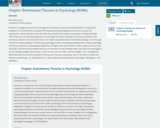
By David M. Buss, University of Texas at Austin. Evolution or change over time occurs through the processes of natural and sexual selection. In response to problems in our environment, we adapt both physically and psychologically to ensure our survival and reproduction. Sexual selection theory describes how evolution has shaped us to provide a mating advantage rather than just a survival advantage and occurs through two distinct pathways: intrasexual competition and intersexual selection. Gene selection theory, the modern explanation behind evolutionary biology, occurs through the desire for gene replication. Evolutionary psychology connects evolutionary principles with modern psychology and focuses primarily on psychological adaptations: changes in the way we think in order to improve our survival. Two major evolutionary psychological theories are described: Sexual strategies theory describes the psychology of human mating strategies and the ways in which women and men differ in those strategies. Error management theory describes the evolution of biases in the way we think about everything. Buss, D. M. (2021). Evolutionary theories in psychology. In R. Biswas-Diener & E. Diener (Eds), Noba textbook series: Psychology. Champaign, IL: DEF publishers.
- Subject:
- Psychology
- Material Type:
- Reading
- Author:
- Maura Krestar
- Date Added:
- 05/19/2021